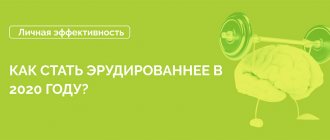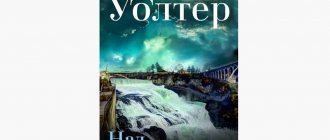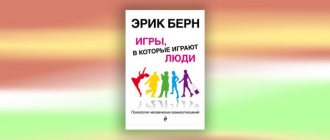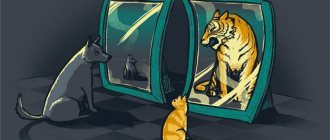Hello, Pavel Yamb is here and we’ll talk today about how to increase erudition.
The modern world has long moved away from narrow professionalism. To succeed, you need to know and be able to do more than hammer rivets. Although, if these rivets weigh more than half a kilo and are white-hot, and you have to catch them with a tin can on the frame of a skyscraper under construction... Yes, then I agree: this skill is more than enough. If you're interested, read my LiveJournal about these skyscrapers.
But you and I are unlikely to be taken there, so let’s return to our calm reality and direct our attention to self-improvement.
For example, in the work of a copywriter, erudition is an essential component of the success of good work. Sources are sources, but you also need to be able to select them. Otherwise, the copywriter will describe in a note about oral hygiene the strengthening effect of concentrated citric acid on tooth enamel. But in fact, if citric acid does anything to the enamel, it only corrodes it. And a link to some completely idiotic site will not help, since a copywriter must have at least a minimal understanding of the elementary effects of acids.
So in order not to write all sorts of nonsense, we need erudition, that is, a lot of varied knowledge about everything in the world.
In addition, our intellect needs constant development - so why not exercise it in such a useful way for work?
Is there any benefit from erudition?
Erudition is a higher level concept. Translated from Latin, this word means a scientist who has overcome rudeness and ignorance. An erudite person, unlike an educated one, has a broader outlook; he absorbs knowledge through books, research, analysis, and not through manuals and textbooks on the subject. Erudition appears on the basis of education, constant reading, and personal understanding of the sources read. A person who has a breadth of knowledge that allows an individual to improve, at the same time rejects primitivism in explaining the structure of the world, and helps the development of society.
Some participants in the debate on the topic “do we need erudition” consider excess knowledge harmful. They call erudition an “abstruse hobby” that is not applicable in everyday life. Knowledge collectors, they say, read everything indiscriminately; most of this knowledge will never be useful to anyone. Most likely, this part of the debaters has little in common with educated people. The flip side of high education is ignorance; with such baggage, a bright future really becomes illusory and unreal.
What erudition gives:
- the ability not just to study a subject, but to generate new things and make discoveries;
- organize technological breakthroughs, ensure technical progress;
- studying the issue from different sources allows you to compare, evaluate the accuracy and correctness of the knowledge gained;
- personal growth, intellectual development, memory and logic training.
The most famous parable emphasizing the need for erudition is about an argument between four blind men telling what an elephant looks like. There is a sculpture in Bonn: each of the blind men holds on to a separate part - a leg, trunk, tail, torso. And they describe the elephant precisely according to their sensations: a pole, a hose, a rope, a soft wall. The elephant cannot be created until all their images are combined together. This will be scientific objectivity, which is possessed to a greater extent by erudites.
Looking at one problem from all sides
The symbol of the Bonn science center is a sculpture representing an elephant and four blind men who are being touched on four sides. One feels the leg, the second the tail, the third the torso, the fourth the trunk. And everyone imagines only what they touched.
Only a collective image allows us to determine that it is an elephant. This confirms the usefulness of the diversified development of an erudite. He knows how to look at a problem as a whole and evaluate it from different angles, applying knowledge.
How to become a polymath
In everyday perception, erudition is knowledge that can be shared with others. But you won’t be able to gain this knowledge by reading everything you can get your hands on. Cramming to remember is also not an option. The main thing in this matter is not the amount of reading or memorized facts, but the ability to analyze, compare, critically evaluate, and check the information received. But it's a must read. We’ll tell you what and how much now.
- It is better to start with a topic that is closer. First, try to become an erudite in your field of activity. When your colleagues recognize you as an expert polymath, you can move on to another area of knowledge of interest.
- You can increase your level with the help of encyclopedias. Bolshaya Sovetskaya, for example, or thematic ones, there are many of them on different topics for different age groups. They are brief, succinct, but contain quite a lot of knowledge on any range of issues.
- There is special training for scholars using the “What? Where? When?" It suggests a seemingly strange, but in fact very interesting list of works that actually increase erudition.
- For two decades, non-fiction book fairs have been held in Russia - a term that identifies a sector of non-fiction, scientific, and applied topics in literature. If you want to show off your breadth of horizons, then you need to read non-fiction. This includes dictionaries, memoirs, popular science literature, cookbooks - all sources of information that contain facts, not speculation.
The ability to analyze includes checking sources of information and textures. Having facts from different sources on one topic, possessing knowledge and the ability to think logically, you can become an erudite in a specific direction - science, religion, politics, etc.
Let your emotions go
There is emotional intelligence, which helps us control and manage our feelings, and there is rational intelligence, which is responsible for our ability to think systematically. As a rule, more attention is usually paid to the rational intellect, and this is not entirely true.
To feel comfortable, you must not forget about the emotional component, which can help you learn to adapt to constant changes and quickly solve emerging problems.
How to do it
Don't be afraid to talk about how you feel. If you are unhappy with something at work or at home, then tactfully let others know about it so that you can jointly solve the problem. Of course, it’s not always possible to find a solution, but at least you won’t keep the negative inside yourself forever.
What's good about non-fiction?
A widely educated person begins not with nuclear physics, but with fiction. It is a very important stage for the development of intelligence. Knowledge of the classics will immediately reveal your education when communicating with others. Further, erudition rests on popular science and scientific literature, which has an antagonistic definition - non-fiction (non-fiction). This part of the literature includes:
- journalism;
- popular science publications;
- encyclopedias, dictionaries, reference books;
- biographies, memoirs;
- religion;
- psychology;
- self-knowledge, self-development,
- art, culture;
- sport, health.
Of course, not funny “popular pictures” from the series of how to quickly lose weight or get rich from an unknown Name, but written by professionals, experts in their field. The current wave of printed products does not have time to be studied, analyzed, and checked. Some people trust false information without having time to check its accuracy. True scholars will never evaluate a fact based on one source of information. They will read several, find inconsistencies, and get a real version of the event. Because they look at the elephant as a whole, which means they know how to analyze.
The connection between intelligence and mental processes
The human psyche is a complex structure, therefore all processes in it are interconnected and interdependent.
In particular, intelligence is largely influenced by the following internal realities:
- Thinking
Some scientists even considered these concepts to be synonymous. But this is fundamentally wrong. Thinking is the process of cognition and processing of information, and intelligence is the ability to competently apply knowledge at the right time. Without mental operations, a person's intellectual level would be very low.
- Will
Volitional efforts are needed precisely in order to master new material, study important books, and bring thoughts to the final result.
- Memory
The ability to retain, store and reproduce information is an integral part of intelligence.
- Attention
Intelligent people are distinguished by an attentive attitude to the world around them. They are able to notice the smallest details, analyze and study them. The development of intelligence is closely related to the improvement of human attention.
- Creativity
Guilford wrote about this sweet couple: intelligence and creativity. This term refers to a person’s ability to think creatively, that is, outside the box, to synthesize original ideas.
Non-fiction of the XX International Book Fair
It is difficult to compile a list of the best books for the development of erudition, because this is a purely individual question. But experts from the largest Book Fair in Russia are quite capable of giving advice.
Gregory Burns. What does it mean to be a dog? And other discoveries in the field of animal neurobiology
Per. from English I. Evstigneeva. M.: Alpina Non-Fiction, 2021. 333 pp.
489 - 547 rub.
Gregory Burns. What does it mean to be a dog? And other discoveries in the field of animal neurobiology
Scientists study animals to try to discover cognitive abilities. Stories about scientific experiments on dogs, dolphins, and fur seals are presented by one of these scientists. Does the dog understand what color is called blue? What is “here” and “there” is clear to us, but to the Navy SEALs? Scientific research is always a complex but interesting process. Having taught dogs not to be afraid of a tomograph, the scientist told what was going on in the dog’s head. Navy SEALs understand musical ri using ultrasound. Everyone has feelings similar to humans.
Advantages:
- the author strives to show that the animal world plays an important role in the life of the planet. They only lack speech skills, otherwise they see, feel, and rejoice like people.
Flaws:
- Laboratory experiments on animals cannot be popularized; this is animal abuse.
Lyalya Kandaurova. Half an hour of music. How to understand and love the classics
M.: Alpina Publisher, 2021. 438 pp.
499 - 504 rub.
Lyalya Kandaurova. Half an hour of music. How to understand and love the classics
The author-musicologist explains the essence of classical music to generations who grew up after Perestroika. Easy-to-read four-part formatting. Read for yourself what the original names mean, it’s not written in an abstruse way, it’s easy and interesting to read. The author twists the plot like a detective film, intricate, mysterious, fascinating. Any play that is described can be downloaded on the Internet using a code and listened to. Knowing the history of creation, the principles of collecting notes into bars, listening becomes much more interesting.
Advantages:
- thanks to the author: I discovered the polyphony of Okegem;
- QR codes - you listen to the work that is written about, this is a good plus.
Flaws:
- I graduated from music school, but it was difficult to navigate among the variety of terms.
Dilshat Harman, Mikhail Mayzuls, Sergey Zotov. The Suffering Middle Ages
M.: AST, 2021. 416 pp.
457 - 696 rub.
Dilshat Harman, Mikhail Mayzuls, Sergey Zotov. The Suffering Middle Ages
A rare example when an Internet public (a community of history lovers - half a million subscribers) became a bestseller. Here you will find explanations for the marginalia in the margins of manuscripts and frescoes of the Middle Ages, strange, sometimes completely obscene. Monkeys in the margins of ancient manuscripts, obscene figures on church walls - where does such sacrilege come from? 600 illustrations, well-written text, seasoned with humor - this is how it turned out to be a historical piece. Its educational character and innovative ideas made it controversial for scientists, but one of the most widely read historical publications.
Advantages:
- it turned out to be a good encyclopedia of medieval icon painting for those just entering the topic, not for professionals;
- five thousand illustrations - that’s cool: European, Christian painting (Catholics, Protestants, Lutherans); The main goal - to unravel the symbolism of medieval paintings - was successfully completed.
Flaws:
- Often the image is not on the page where it is mentioned, this is annoying;
- frivolous pictures, the authors help to understand their meaning, but there is nothing about drawing technique, color symbolism.
Learn languages
When we learn a new language, our brain is actively working: we train our memory by remembering new words, learn something we haven’t done before, train our speaking skills, and try to think in another language. All this sometimes helps to look at the world differently.
The brain of a person who speaks several languages works much more efficiently than the brain of someone who speaks only one language.
How to do it
Find services and applications that will make learning foreign languages easy and enjoyable. There are many resources to help you start learning a new language. Don't forget to practice your conversational skills and be sure to find a native speaker with whom you can correspond or communicate in person.
Non-fiction at the Red Square Book Fair
The selection from the “Popular Science Book” series was made up of publications that were in high demand at the fair and was liked by the literary expert-critic.
Richard Dawkins. Selfish gene
Publisher: Gorpus, translation by N. Fomina, 2013. 512 pp.
564 - 576 rub.
Richard Dawkins. Selfish gene
The author's first book (1976) remains the most widely read of all his works. This is a masterpiece of literature and biology, published in 20 languages. Well illustrated, it teaches about evolution and genetics. What is obvious to biologists will be a discovery to the “non-biological layman.” Informative, interesting: let’s take a walk with the author through time from insects to humans, talk about nature’s strategies, behavioral characteristics, and the “cultural revolution.”
Advantages:
- the author is an excellent conversationalist, smart, subtle, simply talks about complex things;
- we are biological machines - tough but honest;
- serious scientific work, controversial, but presented at a very accessible level;
- Even for a 100% humanitarian, it was tough.
Flaws:
- There are absolutely no illustrations, diagrams, or graphics.
Diana Halpern. Psychology of Critical Thinking
Publishing House PETER. Series: Masters of Psychology, 2000. 512 pp.
Electronic version, download for 240 rubles, 512 pages.
Electronic version downloaded for free, 158 pages.
Ayana Halpern. Psychology of Critical Thinking
A serious work on cognitive psychology, informal logic, in which there is a lot of psychological research. Interesting descriptions of fallacies - logical and intuitive, options for analyzing argumentation, tools for developing effective thinking, many other issues related to logic, memory, and brain function. A good guide for those who want to think modernly and will help with self-education.
Advantages:
- the structure of the text is correct - from simple to complex, each chapter is like an independent work, at the end there are conclusions, terms, it is very convenient to study;
- there are a lot of quotes, examples, problems - the head works, it’s not easy to read diagonally;
- real research, practical application suggested - excellent.
Flaws:
- not found.
David Edmonds. Would you kill the fat man?
Publishing house of the Gaidar Institute. 2021. 256 pp.
David Edmonds. Would you kill the fat man?
Philosophical work on the topics of ethics - “what is good and what is bad.” The science is subtle, with a lot of contradictions and paradoxes, and is described by the author with knowledge of the matter. Easy to read and gives a lot of useful knowledge. Ethical dilemma: are you ready to push one fat man onto the rails to save five tied to the same rails? Questions of the moral philosophy of “walking on corpses” or universal love have always been of interest precisely because of the complexity of choice.
Advantages:
- excellent narrative structure, easy and interesting to read;
- educational: catchy because there is no “correct” answer to some questions, both are wrong.
Flaws:
- a lot has been written about the “trolley problem”, an important point, but it is only a stepping stone to the main topic;
- For some reason, the author delved into the personal lives of female philosophers, completely off-topic, but there is not enough analysis of the problem.
Learn to formulate thoughts briefly
This is where social networks can come to the rescue. For example, on the social network Twitter, you can only leave an entry that consists of no more than 140 characters. It turns out that using Twitter, we learn to organize information and express our thoughts clearly and concisely.
If you don’t want to share your thoughts on social networks, then you can simply take a piece of paper, draw a figure on it and write down your thoughts without going beyond its boundaries.
How to do it
Create an account on Twitter, find a piece of paper or open notes on your phone, decide what boundaries you will set for yourself, and start writing. You can do this at any convenient time to take a little break.
TOP 7 best books that improve erudition
When in the television game “What? Where? When?" the team gives the correct answer to a question that is indirectly related to science, history, the audience is simply amazed: ridiculous topics, and experts answer. Because for them there are no stupid questions. Knowing who eats bees, how lemon changes the color of tea is also important, because there are laws of physics and chemistry, logical chains, and relationships with the cosmos.
Advantages:
- most books in this direction provide answers to numerous questions, becoming a starting point for a serious study of other issues, and thus one’s horizons broaden;
- Almost all authors reveal topics with humor, but behind every word there is scientific confirmation or generally accepted opinion;
- Each author is a scientist with his own theories, discoveries, and very useful publications.
Flaws:
- Most books on this topic have few illustrations, but many specific terms that make it difficult to understand the essence.
Bill Bryson. A Brief History of Almost Everything in the World
Publisher: AST. Series: Civilization: birth, life, death. Translation by V. Mikhailov, 2021. 608 pp.
584 - 644 pp.
Bill Bryson. A Brief History of Almost Everything in the World
A completely unusual encyclopedia about various fields of science - from Darwin’s theory to black holes. She received an award for her contribution to the development of science. It is already a bestseller in America. The author sought to prove that complex things can be told simply, then knowledge will be obtained easily, without straining for precise calculations. As a result, it was written in non-scientific language for the ordinary reader who wants to broaden his horizons. But the external ease of reading does not indicate an entertaining theme.
Once you become interested in a topic, you will quickly find more serious publications about it. From simple to complex is a completely productive way to gain knowledge and develop erudition. The encyclopedia, by the way, discusses the development of the Universe, civilizations, human nature, and the most important world discoveries.
Stephen Juan. Oddities of our body
Publisher: Ripol-Classic. Series: Unusual in the ordinary. Translation by A. Davydova, A. Romanov. 2021. 560 pp.
386 rub.
Stephen Juan. Oddities of our body
Primitive school anatomy does not give a complete picture of our body. The author talks with knowledge and a sense of humor about how the most complex mechanism works inside, what processes take place in it. How a person is born and dies, the likelihood of accidents, their consequences - complex, but important for the perception of oneself in this world questions are covered without tragedy, popularly, with ease. Dwarfs, giants, genetic abnormalities, diseases, longevity - the author talks about all this and much more.
John Lloyd, John Mitchinson. The Book of Universal Delusions
Publisher: Phantom Press. Series: The Book of General Delusions. Translation by A. Rakhuba. 2012. 384 pp.
304 rub.
John Lloyd, John Mitchinson. The Book of Universal Delusions
People very often make mistakes, because knowledge is relative, facts can be interpreted incorrectly, literature is mostly useless. General delusion gives rise to fear of recognition and is consolidated as the norm. This is what the authors are thinking about. Light style, easy to read. It will be very useful for scholars: 320 questions, most of which are in IQ tests, are analyzed in detail and explained.
Robert Enwood. Why bears don't run downhill and 200 more interesting facts that require explanation
Publisher: Dobraya kniga. Series: Books for the curious. 2010. 320 pp.
276 - 470 rub.
Robert Enwood. Why bears don't run downhill and 200 more interesting facts that require explanation
The author collected incredible, ridiculous, interesting stories, beliefs, questions in pubs, on the streets, in shops. Having studied the topic comprehensively, he found a reasoned answer and put it into an easy, popular form. Yes, dogs don't need to be treated to chocolate. No, human height is not a constant; in the evening it is 2 cm lower than in the morning. Do guinea pigs sweat? Stupid questions, aren't they, but the answers, having a scientific background, send scholars to various sections of anatomy, physics, and genetics. And this is not nonsense at all.
Augustus Brown. Why the panda stands on its head and other interesting stories
Publisher: KoLibri. Series: Galileo. Translation by V. Svechnikov. 2010. 384 pp.
206 rub.
Augustus Brown. Why the panda stands on its head and other interesting stories
It is very useful for erudition to have knowledge about our smaller brothers. The amazing world of animals can not only surprise you with their skills and abilities, but also show human habits. Or has man adopted this from animals? It turns out that they also have problems of fathers and children, there are parties, games of “mafia”. It is written with humor, easy to read, and surprises from the first page.
Mick O'Hair. Who eats bees? 101 answers to seemingly idiotic questions
Publisher: Ripol-Classic. Translation by I. Novoseletskaya. 2007. 256 pp.
The electronic version is downloaded for free.
The author's last name is spelled differently on social networks: Hayer, Khara, Hair. He loves unusual, ridiculous questions, and enjoys looking for answers to them that can surprise and enlighten you. His style of presenting material is popular with readers of different ages. After reading the answers, you will be able to show off interesting facts about the company.
Mick O'Hair. Why elephants can't jump and 113 more questions that will baffle any scientist
Publisher: Dobraya kniga. Series: How and why. 2011.256 pp.
271 - 303 rub.
Mick O'Hair. Why elephants can't jump and 113 more questions that will baffle any scientist
Continuation of the previous one. Again strange and funny questions, smart professional answers. The author is the editor-in-chief of a popular scientific magazine, where subscribers send their questions. Here you will find stories about the amount of memory a person has, what is the flight altitude of a butterfly, and why the face becomes crooked when eating sour food. Elephants don’t jump, and sparrows can’t walk—what a paradox! We are looking for answers.
Once every six months
How is it useful? Travel, like magic, enriches your mind. You begin to think creatively and adapt to different situations. Ideas appear out of nowhere - tested for yourself!
Of course, we are not talking about a beach holiday. It is better to combine excursions to temples, waterfalls, museums with swimming in the sea. And you will catch two birds with one stone.
For example, I travel constantly: I go to the mountains, spend the night in tents, fly to other countries, where I get to know a new culture. All this is like a breath of fresh air. Inspires, guides and forces you to move forward. Without travel I would be depressed...
What should you do:
- Search for tours in your area
- View tickets to other cities: Aviasales, Skyscanner
- Buy a tour to another country
- Go live abroad for a few months
How is it useful? Writing by hand activates your memory. You not only print letters, but also estimate the distance to the end of the line, which means you work on concentrating.
Famous writers, including Truman Capote, Woody Allen, and Susan Sontag, created their novels by hand. Although many of their colleagues were already working at the keyboard at the same time. My university teacher said that humans are unique creatures because only they can write by hand. “When you put letters on paper, writing portals open up for you. You just need to start,” she encouraged. And if you learn to control both hands equally, the hemispheres of your brain will constantly develop. That is, it is useful for a right-handed person to write with the left hand, and vice versa for a left-handed person.
What should you do:
- Write and come up with something of your own
- Rewrite texts
- Train both hands
- Take up calligraphy
How is it useful? See yourself from the outside, work on your mistakes, change for the better.
It should look like this: film yourself on your phone or any other professional equipment for 5 minutes. Open the video on your computer and record all your mistakes. Perhaps “uh-uh” sounds like every word? Or are you using the accents incorrectly? Did you see? Now you know what to fix.
What should you do?
- Take yourself on video
- Record errors
- Don't allow them anymore
How is it useful? By transcending yourself, you push boundaries and become wiser, smarter, and better.
Swimming in the lake is comfortable. It is small, shallow on the shore, you feel like a fish in water. Swimming in the ocean is already a bit scary. It is not clear what the depth is there, what predators are waiting and where to swim.
Challenges are an ocean. You, as a sailor, sail beyond your limits and discover a new you. Come up with formats yourself: quests, games, competitions, challenges. It's much more interesting this way!
What should you do:
- Meet someone every day
- Practice yoga
- Jump with a parachute
- Give up the car and walk
- Learn tricks
- Do good
A few simple tips for beginning scholars
If you are interested in accumulating knowledge, analyzing, understanding, knowing more than others about everything in the world, you need to have several mandatory habits.
Save new words
Study newly heard terms and words. While you were studying at university, the flow of new concepts was quite large, your brain was working in good mode. Next, you need to train it yourself so that the creation of neural connections does not stop.
Individual words will not make you an erudite, but each word will lead to a thread of family ties that you will build and study. Your worldview will be structured more and more subtly. The larger the tangle of connections, the faster the simplicity of thinking changes to cognitive complexity.
In practice it will look something like this:
- learn at least three new words per week and retain them in memory;
- first try to understand an unfamiliar word without a dictionary, think logically, try to guess its meaning, then check with dictionaries;
- analyze words that have different effects in different areas: reconstruction of a plant - reconstruction of a historical event;
- read popular science literature, study terms, try to understand their meaning, connections with other categories, wrap a tangle of connections around each word.
Replenishment of the thesaurus
Your lexicon, storehouse - your dictionary-thesaurus. You can expand it by using synonyms in writing and speech. By diversifying your speech with words that are identical in meaning but different in sound, you expand your vocabulary. Example: arrived, arrived, got there, came, showed up, visited, looked in...
In addition, synonyms often superficially unite concepts; a true erudite will easily explain the difference between a typhoon and a cyclone, a mountain and a hill.
Criticism and analytics
Be sure to read criticism, reviews of specialists, experts about the issue of interest. This is the only way to get an objective picture, and not a personal opinion based on first impressions. By studying materials on a specific issue, you will get several points of view:
- from the original source;
- personal;
- an expert who knows the topic.
Criticism is useful in understanding weaknesses. Having three different opinions, you can compare and analyze. With this approach, reading ceases to be a passive assimilation of information and turns into mental efforts called comparative analysis.
Write a lot
Written speech is the materialization of your thoughts, a very difficult matter. You need to learn to express your thoughts in writing, this will help you structure them and build logic. Of course, it is preferable to write not letters to relatives, but on popular science and philosophical topics.
By trying yourself in different sectors of knowledge, you will understand what your strengths are and where you still need to gain intelligence.
Read anytime, anywhere
Not detective stories or romance novels, but philosophical treatises, memoirs, scientific articles. Fiction must also be present, but smart, serious, classic. Today you can read e-books downloaded to your tablet, and audio versions are available (although they are more difficult to perceive and remember). Reading very productively trains the brain, develops memory, and broadens one's horizons.
You can talk as much as you like about Internet search engines, where you can find an answer to any question in a minute, but only an erudite is able to provide not just information, but analytics: a complete, multifaceted picture, solutions, uses, consequences. The Internet is an assistant to the erudite, but it is unlikely to replace him in the near future. So, let’s train our memory, expand our vocabulary, and move towards perfection!
Use your brains
Not in the literal sense, of course. If you've ever thought that with some effort you could become a little smarter than you are now, then that's a good thing. Thinking about the development of intellectual abilities is the first step towards the goal.
Be more curious, constantly learn new things, understand how the processes that interest you function, get to the bottom of incomprehensible things. You will be surprised at how much unknown there is around you.
How to do it
Keep your brain busy with useful work, switch from your usual routine to something you haven’t done before. Learning new skills will help your brain become more flexible and will have a positive effect on your mental performance.
Watching movies
Those who disdain fiction as a source of knowledge are, to some extent, right: the knowledge obtained in this way is unsystematic and chaotic. You don’t know in advance what, besides the plot, the author decided to write about in his book. Therefore, various encyclopedias, reference books and popular science books with magazines will make it possible to quickly and accurately fill up with knowledge.
And there were a great many of them written. Some become outdated quite quickly, such as reference books about individual industries. Those that set out basic things are only supplemented and clarified over time. Over the past 20 years, humans haven’t grown an additional pair of arms (although it would be nice), so information about human anatomy and physiology will be correct for the most part.
By the way, having had the opportunity to read several volumes of an encyclopedia for children published in 1911, I was surprised to find there no glaring discrepancy with the knowledge that is taught to primary school children in modern schools. Natural phenomena, climatic zones, animals and birds are described in a very simple and understandable language. But, probably, then these books were not intended for children 6-7 years old.
Those who do not like to spend time reading can save it and watch movies and shows. Not Brazilian soap operas, of course. Although an inquisitive mind will be able to discover a lot of interesting things about the life and mentality of the inhabitants of distant Brazil, in fact. But it’s still too much of a waste of time for such a tiny amount of useful information. And knowing the history of exactly when Don Pedro fell in love with Donna Rosa is unlikely to help you in your work.
In fact, there are also a lot of educational films. Dozens of films about the human structure - after watching at least some, you can become a real expert not only in anatomy and physiology, but also have an idea of the latest research in this area.
What's good about films: clarity. They not only tell, but also show. And they immediately demonstrate in practice how it works. Geography, geology, city tours, individual pages of ancient and modern history - a lot of films for every taste. You can watch films from the BBC studio alone for months.
Advantages of an erudite person
Without a doubt, developed erudition is an advantage. Let’s look at exactly what advantages such an interesting personality trait provides in life:
- An erudite person feels comfortable in any company. He can support almost any conversation, surprise others with his knowledge, and tell people interesting information.
- He has a better chance of getting a well-paid job and moving up the career ladder.
- If necessary, scholars can easily learn a new profession and change their work activity.
- They are attracted to erudites; many of them have a penchant for leadership and managerial qualities.
- A person has the ability to handle large amounts of information.
- Such people have a higher level of cognitive abilities and a reduced risk of developing senile dementia and Alzheimer's disease.
- An erudite person arouses increased interest from other people and enjoys success with the opposite sex.
- It is easier for erudite people to make new acquaintances and business connections.
- Erudites are more trusted, especially in professional circles.
- Erudite people are more confident and have high self-esteem, which allows them to achieve success in life.
- Smart and developed children grow up in a family of erudites, as their parents pass on their extensive knowledge to them and easily answer any questions.
As you can see, erudition has many advantages, and these are factors that many people should strive for.
Interesting facts about our memory abilities:
Fact 1
Memory and its properties directly depend on a person’s profession. It really is better among announcers, teachers, scientists, and actors. After all, these people have to memorize a large amount of text, constantly repeat it and learn something new.
Fact 2
In fact, a person remembers not what happened to him in objective reality, but his subjective assessments - negative or positive impressions, which can be influenced by any little thing. For example, the whole day could go like a fairy tale, and at the end an event happened that spoiled the mood. Rest assured, a person will remember exactly this, painting his whole day in black colors
Fact 3
There are two types of memory - short-term, or operational, and long-term. During a session, students manage to “push” a huge amount of information into their memory overnight, which disappears immediately after the exam. Patients with so-called senile forgetfulness remember in great detail events that happened in early childhood or many years ago, but are unable to retain in their heads what happened half an hour ago.
What is IQ
In 1912, German psychologist Wilhelm Stern introduced the concept of “intelligence quotient” - IQ. It is determined using various tests with tasks of increasing complexity. The average value is 100. A value of 70 qualifies as mental retardation.
Intelligence does not mean the amount of knowledge accumulated by a person, but his ability to remember and analyze new information, and also be able to use it to solve subsequent problems.
American Andrea Kuszewski is a consultant physician and specialist in the field of behavioral therapy. She works with children with autism who have impaired cognitive abilities. One of her first patients was a boy with mental retardation: his IQ indicated slight mental retardation. After three years of learning reading, mathematics, playing skills, and communication using the method she developed, his IQ was 100. The same successes in the development of intelligence were observed in other children with cognitive disorders with whom classes were conducted.
Consequently, if children with learning problems can develop rapidly, then the average person who does not have such problems, as they say, is in the cards.
Andrea Kuszewski made the following conclusions:
- intelligence is trainable;
- the more you train it, the better the result will be;
- Everyone can develop intelligence, regardless of the level of their initial abilities.
The essence of the concept
Intelligence and its components were first described by the German scientist Wilhelm Stern at the beginning of the 20th century. Then many scales and methods for diagnosing mental abilities appeared, including the famous IQ test.
This concept cannot be equated with cognitive, mental abilities. They are only a working tool of the intellect.
The most comprehensive model for this term was proposed by the American psychologist Joy Paul Guilford. In his opinion, intelligence includes 120 factors.
All of them can be classified according to three indicators:
- content (human mental work);
- operations (method of information processing);
- result.
The development of intelligence is possible if you work on all these points. However, in ordinary life, a person may have many ideas that he analyzes in every possible way, but cannot put into practice. He just doesn't have the skill for it.
It is very important to know how to increase your intellectual level in all areas. But more on that later
Surround yourself with smart people
Our environment sometimes influences us much more than we would like. Therefore, surround yourself with people who will help you become more knowledgeable about issues that you do not understand.
How to do it
Expand your social circle and meet people from whom you can learn something good. You can also join some community of interests and find friends there.
We hope you will adopt a couple of methods from this article.











